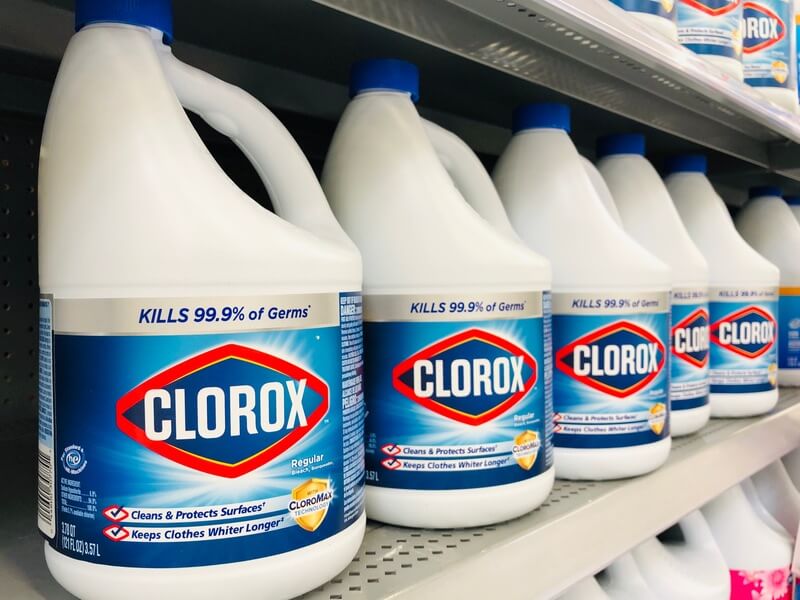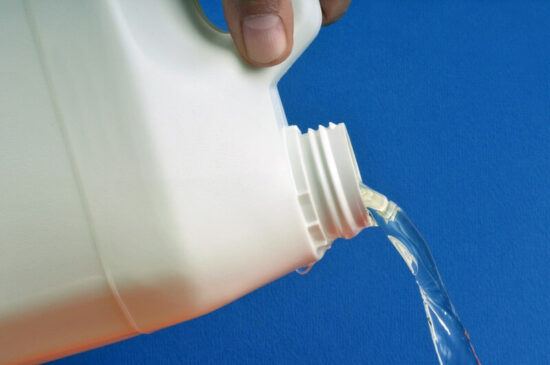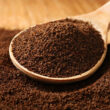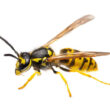Using bleach to kill ants is an interesting method that has its pros and cons. But unfortunately, many homeowners don’t actually know what they are!
This guide will teach you everything you need to know about killing ants with bleach and keeping them away.
Table of Contents
Does Bleach Kill Ants
If you’re dealing with an ant problem, you’ve likely tried a million different DIY techniques. One method that many people swear by is bleach. Bleach is a catch-all cleaning product that homeowners often use in the laundry room, bathroom, kitchen, and more.
But does bleach kill ants?
Bleach does indeed kill ants. It’s a powerful corrosive agent that can slowly eliminate ants on contact. The substance is known to irritate tissue internally and externally.
Despite their tough exoskeletons, ants are no match for the power of bleach. On contact, the bleach seeps into the tiny holes these pests use to breathe. Called spiracles, the holes are nearly impossible to see with the naked eye. But they’re exposed enough for bleach to get in and kill them.
When it does, the bleach wreaks havoc on the ant’s internals. It essentially burns the insect from the inside out while suffocating them in the process!
Does Bleach Repel Ants & Keep Them Away?
Bleach is powerful enough to kill ants within an hour. But does it repel ants and keep them away?
Bleach is most effective at killing the ants you can see. Unlike other pest control methods, it’s not something the ants can take back to the nest to eradicate the entire colony.
- Kills common household ants including acrobat, crazy, ghost, little black, odorous house, pavement, and other sweet-eating ants
- As worker ants discover the bait, they share it with the rest of the colony to eliminate them all
- You should see a significant decrease in the number of ants visiting the bait stations within just a few days
- Place stations near areas where you’ve seen ant activity
But even still, bleach can have a long-term effect on ants. Bleach produces strong fumes that confuse the senses and keep ants out. The smell is too overwhelming, so most ants try to avoid it. If you use bleach regularly to clean floors and hard-top surfaces, it can do a fantastic job of keeping ants out long-term.
But that’s not the most impressive thing about bleach. One of the more useful applications for using bleach to keep ants away is by eliminating scent trails.
When scout ants find food, they create a chemical trail to guide workers to it. Think of it as a pheromone-based breadcrumb trail that helps ants navigate to and from the nest. If you ever see ants in your home, pay attention to how they move.
Chances are, you’ll see them marching along a straight line. They’re following the scent trail!
Not only can bleach kill ants, but it can also wipe out the scent trail entirely. It removes the pheromones, making it impossible for ants to return to the food source. If any ants were hiding out, they’d also have difficulty finding their way back to the nest.
How To Use It
Bleach is something you likely already have in your home. You may even have experience using it in other ways.
Using bleach to kill ants isn’t difficult, but there are a few tricks to utilizing it strategically.
1. Take The Right Safety Precautions
First things first, you need to remember that bleach is corrosive. It will irritate the skin by causing rashes. Not only that, but the fumes can make your eyes burn and hurt your lungs.
Some people will have strong reactions to bleach, so be extra careful. It’s not something you want to use while throwing caution to the wind. Safety is the most important thing.
Pop on a pair of gloves when handling bleach before you go killing ants. If you’re particularly sensitive, you might consider wearing eye protection and a ventilation mask.
Expert Tip: Always avoid using bleach in a room without proper ventilation. Open the windows and turn on fans to keep the fumes moving. When using bleach to kill ants, there’s a greater risk of getting the substance on you. Take all necessary safety precautions to stay safe.
2. Spray Solution
The easiest way to use bleach to kill ants is to spray it on them directly. Pour some bleach into a thick plastic or glass spray bottle, and spray it on any ants you see.
Most people stick to straight bleach from the jug they buy at the grocery store. However, you can dilute it to a 50/50 mix with water if the fumes are too overwhelming. The ants will still die even with water dilution.
3. Direct Pour
Spot an ant hill outside? Your best approach here is to pour the bleach into the nest directly. Focus the stream on the entrance on the top and allow the bleach to soak into the soil.
Expert Tip: If you want it to have an even more substantial effect, mix the bleach with boiling water. Boil a large pot of water before adding bleach. The mix of heat and bleach will kill the colony of ants in no time!
4. Bleach Wipe
Another easy way to utilize bleach is to use it for its intended purpose: Cleaning. Use the bleach on surfaces you know that ants frequent to keep them away. Wipe down all countertops and use bleach to wipe down hard floors.
Pay close attention to rooms that contain items that attract ants. The kitchen is the biggest culprit, thanks to the food remnants. Get every last inch of the floor clean, and focus on the corner where crumbs can accumulate.
Expert Tip: It’s also a good idea to wipe floors around doors and entryways. The same goes for windows the ants could use to get their way inside.
5. Bleach Bait
This technique isn’t as effective for killing ants with bleach directly, but it might help to wipe out the colony slowly.
Most DIY ant bait traps utilize borax or another substance that’s lethal to ants. Bleach works well, too.
Mix the bleach with something sweet. You can use peanut butter, powdered sugar, and other common baits.
Keep in mind that too much bleach will overpower the sweet stuff. So, use only a little bit. The goal is to entice the ants to take the bat back to the nest. But if you use too much bleach, it’ll have the opposite effect.
6. Mind The Fumes
After using the bleach to kill ants, be mindful of the fumes. Bleach can make you, your family, and your pets sick. Plus, the bleach on floors and surfaces can easily irritate the skin.
Give your home a few hours to air out. Open the windows and turn on fans to dissipate the fumes before letting any sensitive individuals enter.
The Downsides Of Using Bleach To Get Rid Of Ants
Using bleach to kill ants is an effective strategy, but is it the best solution? There are a few downsides to using bleach that you’ll want to consider.
The Potential For Damage
If you’ve ever mistakenly used bleach when you shouldn’t have, you know that it’s a damaging substance. Bleach is naturally corrosive. That means it eats away a wide range of materials.
Bleach is totally fine to use on tile and many hard surfaces. But for things like wood or delicate stone? In those cases, bleach will do more harm than good!
Bleach is notorious for damaging surfaces. Even seemingly indestructible stone can experience roughness due to bleach exposure. You may even notice staining.
On wood, bleach can ruin stains and protective finishes. For plastic, it can essentially melt surfaces away!
You have to be careful about how you use bleach to kill ants. Otherwise, it’ll cause more of a headache than you want.
Ruined Clothing
Another thing to be wary of when using bleach to kill ants is its effects on clothes. Bleach is a lightener that can make your whites gleam. But on colored clothes, it will leave noticeable stains.
It doesn’t take much to notice, either. Even a small drop will leave behind a near-white stain.
That means you must be careful about the clothes you wear, the towels you use, and even the nearby carpets.
Harsh Fumes
We’ve already touched on the fumes, but it’s important to consider when considering bleach as an ant-killing solution.
Bleach has an unmistakable smell. It’s incredibly intense and can burn your lungs if you inhale enough.
Those with pets and kids might want to reconsider using bleach. At the very least, you’ll need to take special precautions to ensure that the fumes dissipate before pets and kids reenter.
Skin Irritation
Finally, there’s the risk of irritation. As a corrosive liquid, bleach can burn through tissue. It’s known to cause rashes.
The worst part is that it can cause trouble even when you think it’s safe to be around. For example, leaning on a countertop you cleaned with bleach could lead to irritation along your entire arm.
Alternative Methods To Consider
If you’re on the fence about using bleach to kill ants or repel them, don’t worry. There are plenty of alternatives that work as well, if not better than bleach.
- Kills common household ants including acrobat, crazy, ghost, little black, odorous house, pavement, and other sweet-eating ants
- As worker ants discover the bait, they share it with the rest of the colony to eliminate them all
- You should see a significant decrease in the number of ants visiting the bait stations within just a few days
- Place stations near areas where you’ve seen ant activity
Diatomaceous earth is one of the more popular DIY ant solutions. The powder is made tiny from the fossilized remains of tiny aquatic creatures. Those remains create an abrasive powder that can dehydrate ants on contact when crushed up.
Sprinkle some on any ants you see, and it’ll make quick work of the pests.
You can also turn to commercialized sprays, ant granules, and bait traps. They all use chemicals that target ants. As always, be careful when using chemical products around pets and family.
Does Clorox Bleach Kill Ants?
Clorox bleach does kill ants. Clorox is no different than an off-brand bleach product. Bleach of any kind can kill ants with no problem.

As long as it’s not overly diluted, it should work just fine.
Conclusion
Killing ants with bleach is completely viable. However, it might not be the method you want to use (depending on your preferences).
If you have any other questions about using this method to deal with ants, ask away!



